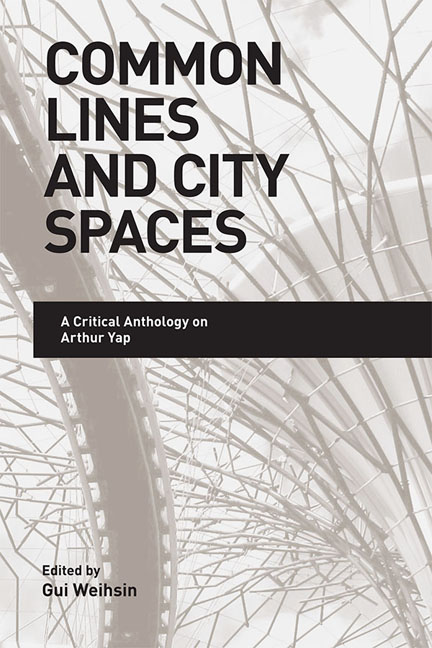Book contents
- Frontmatter
- Contents
- Acknowledgements
- About the Contributors
- 1 Common Lines and City Spaces: Introduction
- 2 The Transformation of Objects into Things in Arthur Yap's Poetry
- 3 “the same tableau, intrinsically still”: Arthur Yap, Poet-Painter
- 4 “go to bedok, you bodoh”: Arthur Yap's Mapping of Singaporean Space
- 5 On Places and Spaces: The Possibilities of Teaching Arthur Yap
- 6 Arthur Yap's Ecological Poetics of the Daily
- 7 “except for a word”: Arthur Yap's Unspoken Homoeroticism
- 8 “a long way from what?”: Folkways and Social Commentary in Arthur Yap's Short Stories
- Index
- Plate section
7 - “except for a word”: Arthur Yap's Unspoken Homoeroticism
Published online by Cambridge University Press: 19 May 2017
- Frontmatter
- Contents
- Acknowledgements
- About the Contributors
- 1 Common Lines and City Spaces: Introduction
- 2 The Transformation of Objects into Things in Arthur Yap's Poetry
- 3 “the same tableau, intrinsically still”: Arthur Yap, Poet-Painter
- 4 “go to bedok, you bodoh”: Arthur Yap's Mapping of Singaporean Space
- 5 On Places and Spaces: The Possibilities of Teaching Arthur Yap
- 6 Arthur Yap's Ecological Poetics of the Daily
- 7 “except for a word”: Arthur Yap's Unspoken Homoeroticism
- 8 “a long way from what?”: Folkways and Social Commentary in Arthur Yap's Short Stories
- Index
- Plate section
Summary
Arthur Yap was predisposed to silences. I had only ever spoken to him twice in my life, but we had been writing letters back and forth until a year before he passed away on 19 June 2006 of nasopharyngeal carcinoma. Standing before his coffin at his funeral, I could not believe that the poet who had befriended me and encouraged me to keep publishing my own poems was really gone. Gentle and soft-spoken in real life, his reticence had not been a consequence of indifference. I always believed that his silences stemmed from a desire to reserve quick judgment, an inclination that informs his poetry as well. I have tended to equate his general sense of restraint with kindness. In his poems, this quality of restraint opens up a spectrum of conflicting interpretations; the poet is like a quiet but generous host who has invited a whole range of readers to wander and settle comfortably inside the spacious house of his poetry.
Kindness was probably not what literary commentators had in mind when they underscored Yap's “private sensibility” (Singh 1999, p. 15) and his refusal to engage with nation-building discourses in outrightly opinionated and political ways in the poems. During an interview, Yap had once answered “no” to a question about whether he was in sympathy with the opinion of Edwin Thumboo, a poet regularly regarded as a literary pioneer in Singapore, that “the writer must explain his society, bring into focus the forces, whether healthy or pernicious, which move society” (quoted in Wong 2009). Yap seemed to express views that emanated from a temperament that was clearly not comfortable or convinced by the call for poets to take a public role on issues such as the formation of a national identity. In an earlier essay of mine, I made a case for the claim that the great majority of poems in Yap's oeuvre confront social discourses through an unwavering position of uncertainty and scepticism, in which contradictory attitudes are often juxtaposed and left without one winning out over the other. Hovering between a conscious and an involuntary response across a range of implied or explicit attitudes ranging from uncertainty, through ambivalence and ambiguity, Yap's sense of a Keatsian negative capability is bounded to a position of liminality that runs counter to any straightforward critique or analysis of socio-political concerns.
- Type
- Chapter
- Information
- Common Lines and City SpacesA Critical Anthology on Arthur Yap, pp. 133 - 150Publisher: ISEAS–Yusof Ishak InstitutePrint publication year: 2014



